Each year, we get through 102 billion plastic shopping bags across the U.S., which is a truly astonishing figure. Team that alongside the 12 million barrels of oil that are required to manufacture those bags, and we’ve got quite a problem on our hands.*
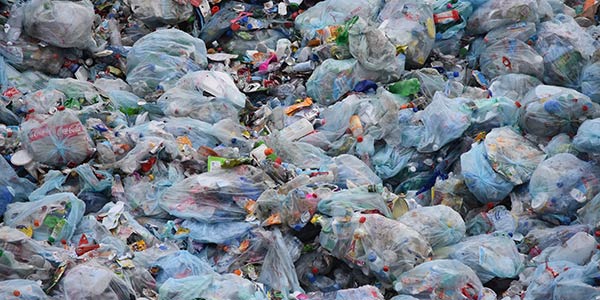
Many of us are the under the impression that plastic bags are not recyclable, but that’s not true! And it’s sad to say that such impressions have had pretty shocking results.
Take, for example, research from Waste Management, which has estimated that less than 1% of plastic bags are returned for recycling.**
What’s the Problem?
In order to understand how vitally important it is to avoid mixing plastic bags in with our general recycling, perhaps we first need to better understand the problem.
Let’s take a banana peel as an unexpected starting point. If you toss a banana skin into the trash, around 2-5 weeks later it will have bio-degraded, leaving behind little or no remnants of its existence. Toss a plastic bag into the trash, and it can take up to 1,000 years to decompose.***
To give this a little context, it’s quite feasible that if plastic bags had been around at the time Christopher Columbus voyaged to North America in 1492, those same bags could still be around today, and furthermore, that very same plastic bag could still be in existence in the year 2492...and most likely, beyond!
A pretty sobering thought.
So why can’t plastic bags be included in mixed-recycling?
Of course, not every single one of the 102 billion plastic bags we work our way through each year end up mixed in with our other curbside recycling, but even if it’s 1 in 10, that’s still over 10 billion!
This is an issue as when it comes to recycling plastic bags, a special type of sorting and processing machine is required – and to be frank, not all recycling plants have them.
As a result, it’s not uncommon for recycling plants to shut down their entire operations several times a day, due to entangled plastic bags.**** And even after they're time-consumingly plucked out of a recycling plants expensive machinery, they’re most likely going to be tossed into a pile, and sent to landfill...so it’s a real lose/lose.
What’s the solution?
A great starting point when it comes to appropriately discarding of, or better yet – recycling, your plastic bags, is to look up the rules under which your local curbside collectors operate.
If curbside recycling of your bags isn’t an option, the most prevalent and accessible location to drop them off is likely to be the local grocery store. Most grocery stores now have a dedicated receptacle for collecting such items, all you need to do is make sure they’re completely empty of any garbage, and dry.
At Glasdon, our C-Thru™ 50 Recycling Bin Range has proven to be a great solution for plastic bag recycling, as well as many other applications. Take a look at the C-Thru 50 in action, or additionally, see our full range of plastic bag recycling bins at the bottom of this page:
The benefits of plastic bag recycling...
Recycling our plastic bags comes with a host of benefits. Not only will you have peace of mind that you’re responsibly discarding of your waste, but you’ll also:
Help prevent 100,000 annual marine wildlife deaths due to ingested plastic bagsCut down on the 1 trillion bags produced worldwide each year
Save 30 cubic yards of landfill space
Protect precious natural resources, and cut down air pollution
Reserve the 4.3 billion barrels of crude oil used in annual plastic bag production
(Source: Greener Ideal)
Furthermore, recycled plastic bags can also be turned in to brand new products, which is a great way to add to the circular economy.
For example, plastic bags and wraps are often turned into plastic lumber that is used to make park benches, backyard decks and fences – they’ve even been known to be turned into playground equipment!
If you’d like to take control of plastic bag recycling in your organization, but need a little inspiration, take a look at how grocery giant Food Lion personalized our Nexus® 64G Recycling bins, creating a dedicated recycling zone.
Alternatively, check out our wider range of designated plastic bag recycling bins:
Plastic Bag Recycling Bin Options:
| C-Thru™ 50G Plastic Bag Recycling Bin | Nexus 26G Plastic Bag Recycling Bin | |
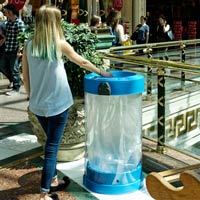 |
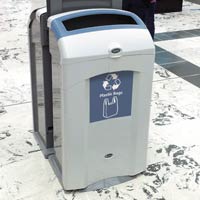 |
|
| The versatility of the C-Thru™ 50G makes this unit suitable for both indoor and outdoor applications. Dedicated apertures and distinguishable decals also reduce the risk of any cross-contamination. | The modern design of the Nexus® 26G offers the luxury of flexibility when it comes to unit placement. Why not create a centralized recycling zone by installing a series of Nexus 26G’s for a variety of waste streams? |
| Nexus 36G Plastic Bag Recycling Bin | C-Thru™ 48G Plastic Bag Recycling Bin | |
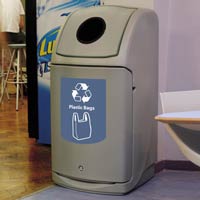 |
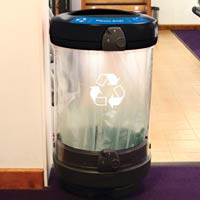 |
|
| The Nexus® 36G hosts a stylish, modern exterior, yet also holds a high capacity of recyclable waste. This unit is suitable for food stores and canteens, as well as a host of other environments. | The C-Thru™ 48G offers a large 48 gallon capacity container for plastic bags. The clear body enables viewing of contents to ensure there is no contamination of waste. |
For more information on any of the products, please get in touch today, we look forward to hearing from you!
Sources:
*https://www.unric.org/en/latest-un-buzz/28776-100-billion-plastic-bags-used-annually-in-the-us
**http://www.wmnorthwest.com/guidelines/plasticvspaper.htm
***https://www.thebalancesmb.com/how-long-does-it-take-garbage-to-decompose-2878033
****https://www.huffingtonpost.co.uk/entry/how-to-recycle-plastic-bags_us_5c4b80f8e4b0e1872d43b9a4




